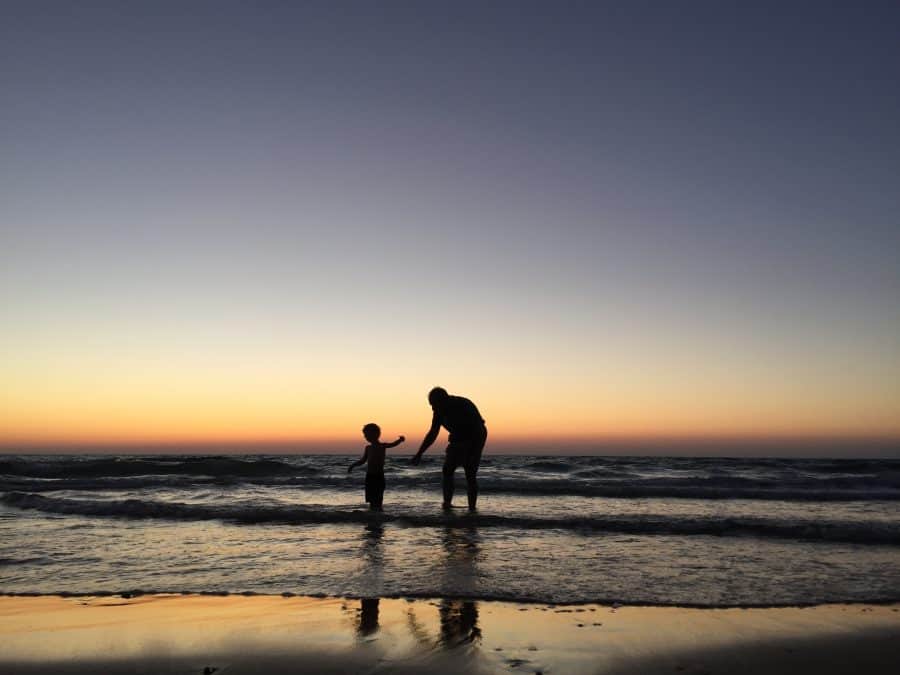When it comes to getting an answer to this specific question, I’ll start off by saying; salt water from the sea is known to have many beneficial effects on anyone suffering from eczema.
Several studies on the healing benefits of salt water pertaining to eczema, by researchers around the world, have come up with multiple answers, which often depend on the type of eczema one is suffering from. While kids are known to be the first victims of such a problem with their skin, visiting the beach and going for a dip, have been known to have a healing effect on the body. Some say that the salt content in seawater is known to rinse out the fluid present in blisters caused by eczema, as well as adding a healing factor to common eczema rashes.
How do I keep my skin safe when at the beach?
In most cases, studies have revealed that adults & children, who come back from a vacation at the beach, are more likely to notice the redness of their skin has reduced. The salt water has proven to be beneficial for the skin. The salt in the sea water is known to dry up the skin while at the same time, giving a-way for the skin to heal faster than expected. It is sort of acting as an antiseptic for the skin and helps dial down aggravation. While experts suggest parents should take their children suffering from eczema to the beach, they also have pointed out that parents should take precautions, still understanding the overall environment.
Always look out for a shaded area
Even though salt water is great for treating eczema naturally, exposing the skin to the sun while at the beach can aggravate the itchy feeling on the skin. Therefore, whenever you book a trip to a location close to the sea, ensure that you have booked a beach hut with cozy shade or probably carry along a pop-up shade umbrella. Not all beach authorities help their visitors with shade, especially those beaches that are not monitored. Carrying along a shaded umbrella can be tiresome, but that is what would protect you or your child’s skin condition from getting more aggravated.
Ensure you have arrangements for sunscreen
While kids cannot contain their excitement once they spot the beach, it is always advisable for you to apply sunscreen before leaving to enjoy beach festivities. Ensure that the sunscreen is a mineral-based one and not something that would wash away the moment they take a dip in the water. Do not take chances by letting them reach the beach and then apply the sunscreen as they may have fun in the sand while making their skin sandy. Applying it then would not have any effect. Also when you intend to re-apply the cream to ensure that the skin is clear of sand while wiping it with a clean towel. This allows a better application that stays for a very long time.
Start wearing covered clothing
While kids are at the beach, many choose to be in their shorts, but that may aggravate their skin condition even further. Constant exposure to the water while the sun is glaring, only adds up to cause even more serious trouble for the skin in general. Therefore, getting body suits or wetsuits for yourself and your child is likely to give yourselves the comfort of taking a dip in the ocean, while also not getting affected by the sun’s rays on the skin. Whenever you feel hot, taking a quick dip can cool things off in no time. This keeps you protected while allowing yourself to have fun simultaneously. This clothing is also known to prevent the harmful UV rays from affecting the body while being outdoors for long periods of time.
Carry a bed sheet or a large mat
There are times when you may not have the luxury of beach chairs to relax. If that happens, you should always carry along a sheet or mats that can be spread out on the sand and give you & your child a sand-free zone to rest. In case your skin itches when exposed to a lot of sand or the sun’s rays, you guys can always come over and rest while applying topicals and sunscreen to soothe the skin. This also gives you the pleasure of taking a break from the sand and getting to a clean and dry area.
Do not hold back from the saltwater
It is said that the salt and the magnesium content in seawater is known to heal eczema and calm the itchiness found for those suffering from such a skin condition. If you intend to stay in the water, that’s quite fine, as that is known to heal the skin well without having to receive medication for it. There are cases when there is an initial stinging pain for those who are suffering from eczema symptoms; it will die down once the skin is accustomed to the water. The salt in the water will help clear any infection while acting as an antiseptic for the skin. Applying petroleum jelly to the affected area can prevent stinging while not creating any barrier for the salt water to play its part.
Do not forget to take a bath or shower
Even though salt water is known to have benefits for those suffering from eczema, it is also not good for the skin when you allow it to sit on your skin well after you have left the beach. While beaches are known to have showering areas for the public, giving your child or yourself a quick shower can make a huge difference. There are instances where you may get delayed a bit from reaching your hotel, and that can result in aggravated and irritated skin. A bath or shower with fresh water removes the sunscreen, salt, as well as the sand from the skin while letting it heal and recover on its own.
Keep your car cool
Whenever you leave your car behind to hit the beach, ensure that the car is parked in a shaded area and not directly under the sun. The constant heat coming from the sun can get trapped inside while making it uncomfortable for the skin when you get back from the beach. Therefore, ensure that it is parked in the shade or if there is no choice, first ensure that the trapped heat is let out by opening the doors for an extended period of time. This can prevent the affected area of the skin from itching more and thus making this family vacation super enjoyable.
The role of Epsom Salts
Now, there are times when not everyone can get access to the beach. So in this scenario, you can always replace the effect of the salt water from the beach with Epsom salts. While these salts are manufactured using sea minerals and salts, it is known to have a better effect on your skin when in use. Using Epsom salts while bathing or applying the affected area with Epsom salt has been done for years and is something I even currently do when my eczema is acting up.
While 70% of cases typically start with children under 5, many adults suffer from eczema well into their fifties and sixties; 60% of infants are often known to become a victim of eczema, and more symptoms follow-up in adulthood. While infants are very little and cannot express their problems, things get really difficult for them. Therefore, always keeping a bottle of Epsom salt, cotton balls, and freshwater allows you to immediately treat and cleanse the affected area and keeping your child safe. When it comes to caring for eczema at home, experts recommend the following especially after coming back from a vacation and being exposed to sea salts.
- Always avoid the use of scrubbers on the skin that can aggravate it further
- Not all soaps can suit eczema, and so using a mild cleanser is definitely the best option
- Always keep the skin moisturized and avoid it from drying off completely
- Do not wear clothing right after bathing, instead apply an ointment or cream before getting dressed
- Whenever you make use of Epsom salts for replicating salt water from the sea, ensure that you pick reputable brands and not just anything you can get your hands on.
You can find a way more in-depth article on Epsom salt and how it’s super beneficial for us eczema sufferers. Check it out here.
Final Thoughts on This Matter
While several ask the question is saltwater good for Eczema, it has been backed up through many case studies that people who have been suffering from eczema, have known to find benefits after coming back from a beach vacation. The sodium content in the sea water is known to have a semi-drying effect on the skin and thus brings out the excessive fluids present in common eczema blisters.
Has Saltwater helped your eczema symptoms in the past? Maybe you have a different outlook on things. Please comment below with your honest opinion. I look forward to hearing from you all!
Recent Posts
Eczema vs Bed Bug Bites: How to Tell the Difference? (W/ Pictures)
Trying to figure out the difference between eczema vs. bed bug bites? If your skin is covered in itchy red welts or splotches, your first thought might be that you are dealing with eczema. It is,...
Best Sunscreen for Babies With Eczema: Top 13 Picks (Updated 2020)
With summer always on the verge, it’s never too early to start looking for the best sunscreen for babies with eczema. Oh yes, even though winter is on the rise at the time of this article...

